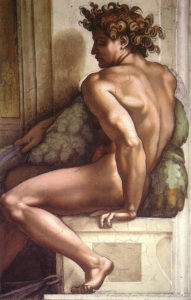Personal Life
Personal Life
Michelangelo was a devout Catholic whose faith deepened at the end of his life. He was abstemious in his personal life, and once told his apprentice, Ascanio Condivi: “However rich I may have been, I have always lived like a poor man.” Condivi said he was indifferent to food and drink, eating “more out of necessity than of pleasure” and that he “often slept in his clothes and … boots.” His biographer Paolo Giovio says, “His nature was so rough and uncouth that his domestic habits were incredibly squalid, and deprived posterity of any pupils who might have followed him.” He may not have minded, since he was by nature a solitary and melancholy person, bizzarro e fantastico, a man who “withdrew himself from the company of men.”
It is impossible to know for certain whether Michelangelo had physical relationships (Condivi ascribed to him a “monk-like chastity”), but the nature of his sexuality is made apparent in his poetry.[61] He wrote over three hundred sonnets and madrigals. The longest sequence displaying a great romantic friendship, was written to Tommaso dei Cavalieri (c. 1509–1587), who was 23 years old when Michelangelo met him in 1532, at the age of 57. These make up the first large sequence of poems in any modern tongue addressed by one man to another, predating Shakespeare’s sonnets to the fair youth by fifty years:
I feel as lit by fire a cold countenance
That burns me from afar and keeps itself ice-chill;
A strength I feel two shapely arms to fill
Which without motion moves every balance.
— (Michael Sullivan, translation)
Cavalieri replied: “I swear to return your love. Never have I loved a man more than I love you, never have I wished for a friendship more than I wish for yours.” Cavalieri remained devoted to Michelangelo until his death.
In 1542 Michelangelo met Cecchino dei Bracci who died only a year later, inspiring Michelangelo to write forty-eight funeral epigrams. Some of the objects of Michelangelo’s affections, and subjects of his poetry, took advantage of him: the model Febo di Poggio asked for money in response to a love-poem, and a second model, Gherardo Perini, stole from him shamelessly.
The openly homoerotic nature of the poetry was a source of discomfort to later generations. Michelangelo’s grandnephew, Michelangelo Buonarroti the Younger, published the poems in 1623 with the gender of pronouns changed, and it was not until John Addington Symonds translated them into English in 1893 that the original genders were restored. Even in modern times some scholars continue to insist that, despite the restoration of the pronouns, they represent “an emotionless and elegant re-imagining of Platonic dialogue, whereby erotic poetry was seen as an expression of refined sensibilities”.
Late in life, Michelangelo nurtured a great platonic love for the poet and noble widow Vittoria Colonna, whom he met in Rome in 1536 or 1538 and who was in her late forties at the time. They wrote sonnets for each other and were in regular contact until she died. These sonnets mostly deal with the spiritual issues that occupied them. Condivi recalls Michelangelo’s saying that his sole regret in life was that he did not kiss the widow’s face in the same manner that he had her hand.

